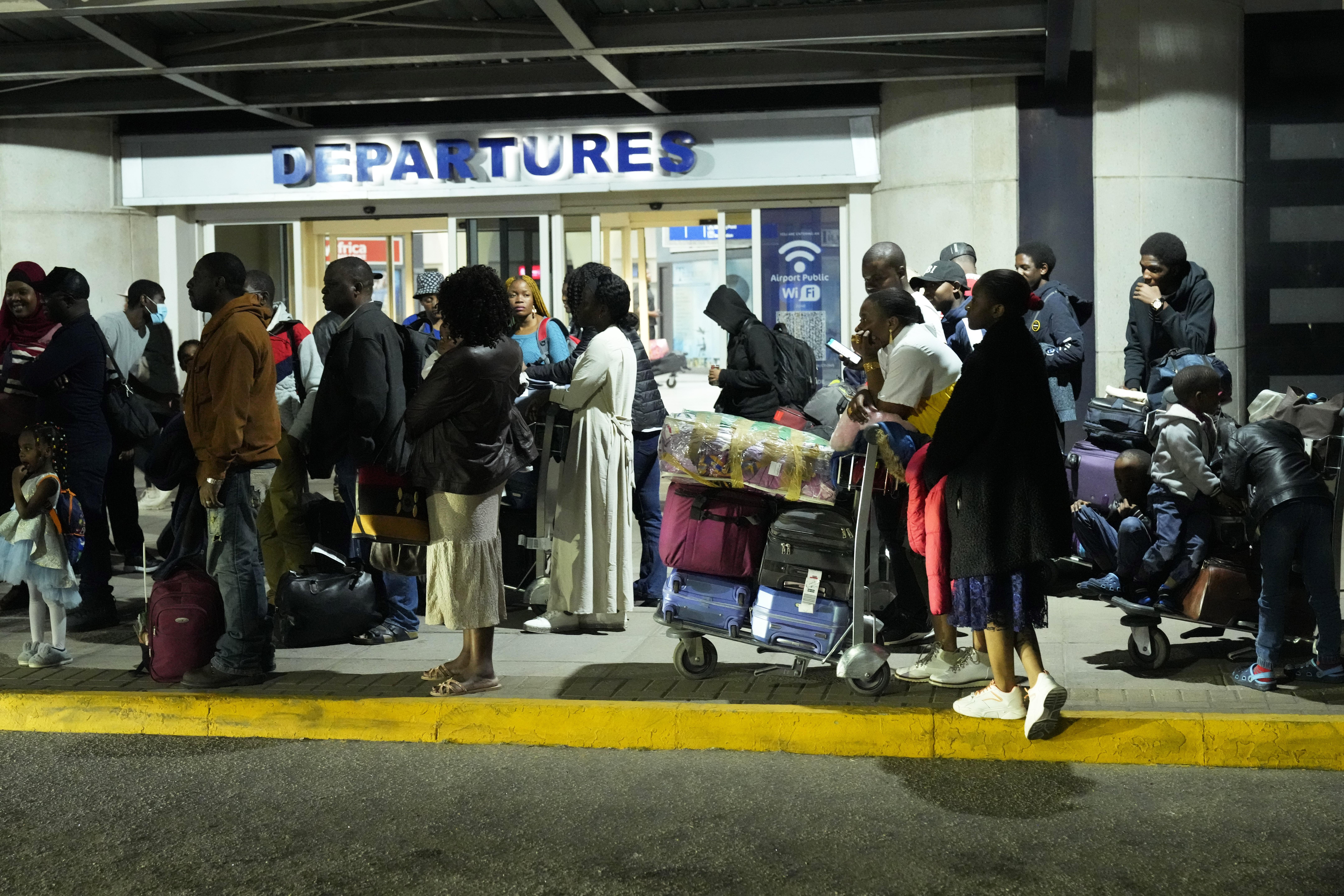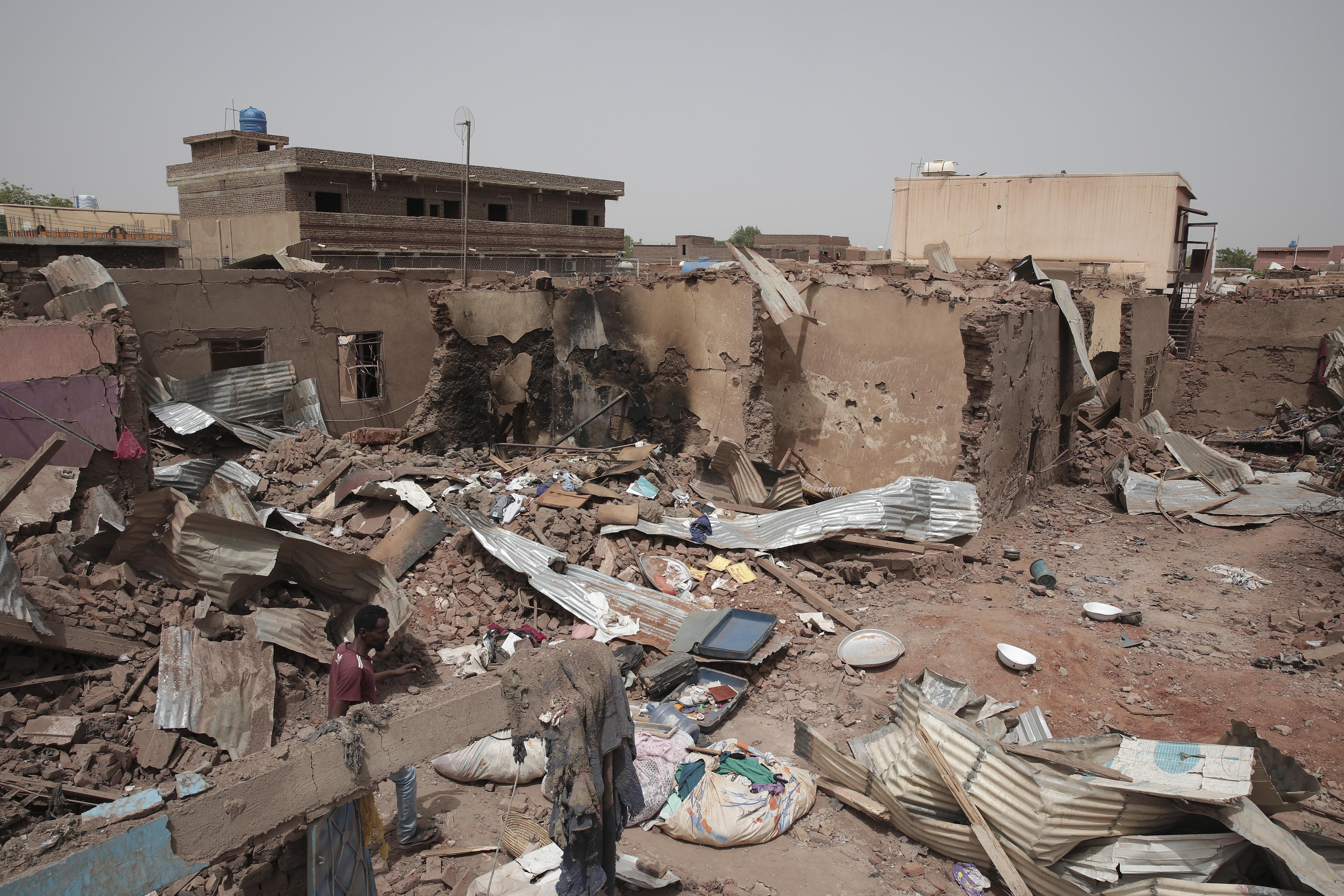 Zimbabwean evacuees from Sudan are seen upon arrival at Robert Mugabe International airport in Harare, Zimbabwe, April 28, 2023. (PHOTO / AP)
Zimbabwean evacuees from Sudan are seen upon arrival at Robert Mugabe International airport in Harare, Zimbabwe, April 28, 2023. (PHOTO / AP)
KHARTOUM – Strikes by air, tanks and artillery rocked Sudan's capital, Khartoum, and the adjacent city of Bahri on Friday, witnesses said, mocking a 72-hour truce extension announced by the army and a rival paramilitary force.
Hundreds have been killed and tens of thousands have fled for their lives in a power struggle between the army and Rapid Support Forces (RSF) that erupted on April 15 and disabled an internationally backed transition toward democratic elections.
The fighting has also reawakened a two-decade-old conflict in the western Darfur region where scores have died this week.
READ MORE: Sudan's army: Paramilitary forces hit Turkish evacuation plane
In the Khartoum area, heavy gunfire and detonations rattled residential neighborhoods. Plumes of smoke rose above Bahri.
Despite global appeals for talks, army chief al-Burhan said it’s unacceptable to sit down with RSF head Mohamed Hamdan Dagalo whom he called "the leader of the rebellion"
"We hear the sounds of planes and explosions. We don't know when this hell will end," said Bahri resident Mahasin al-Awad, 65. "We're in a constant state of fear."
The army has been deploying jets or drones on RSF forces in neighborhoods across the capital. Many residents are pinned down by urban warfare with scant food, fuel, water and power.
At least 512 people have been killed and close to 4,200 wounded, according to the United Nations, which believes the real toll is much higher. The Sudan Doctors Union said at least 387 civilians had been killed.
The RSF accused the army of violating an internationally brokered ceasefire with air strikes on its bases in Omdurman, Khartoum's sister city at the confluence of the Blue and White Nile rivers, and Mount Awliya.
The army blamed the RSF for violations.
The ceasefire is supposed to last until Sunday at midnight.
The violence has sent tens of thousands of refugees across Sudan's borders and threatens to compound instability across a volatile swathe of Africa between the Sahel and the Red Sea.
ALSO READ: Sudan's factions agree to extend truce but fighting goes on
"From the war planes to the tanks and rockets, we had no other option than to leave," said Sudanese man Motaz Ahmed, who arrived in Egypt's capital Cairo after a five-day trip.
"We left behind our homes, our work, our belongings, our vehicles, everything, so we can take our children and parents to safety."
 A man walks by a house hit in recent fighting in Khartoum, Sudan, April 25, 2023. (PHOTO / AP)
A man walks by a house hit in recent fighting in Khartoum, Sudan, April 25, 2023. (PHOTO / AP)
Foreign governments airlifted diplomats and citizens to safety over the past week. Britain said its evacuations would end on Saturday as demand for spots on planes had declined.
The US said several hundred Americans had departed Sudan by land, sea or air. A convoy of buses carrying 300 Americans left Khartoum late on Friday on a 525-mile trip to the Red Sea in the first US-organized evacuation effort for citizens, the New York Times reported.
Darfur deaths
In Darfur, at least 96 people had died since Monday in inter-communal violence rekindled by the army-RSF conflict, UN human rights office spokesperson Ravina Shamdasani said.
Releases and escapes from at least eight jails, including five in Khartoum and two in Darfur, were compounding chaos, she added.
In El Geneina, capital of West Darfur, a major hospital supported by medical charity MSF was looted over the past two days, the group said.
"Many people are trapped in the midst of this deadly violence. They fear risking their safety and lives trying to reach the rare health facilities that are still functional and open," said Sylvain Perron, MSF's deputy operations manager for Sudan.
The United Nations said its offices in Khartoum, El Geneina and Nyala were also ransacked. "This is unacceptable – and prohibited under international humanitarian law. Attacks on humanitarian assets must stop," UN aid chief Martin Griffiths posted on Twitter.
Relief agencies have been largely unable to distribute food to the needy in Africa's third-largest country, where a third of its 46 million people were already reliant on donations.
Among Sudan's neighbors, Egypt said it had taken in 16,000 people, while 20,000 had entered Chad and the UN refugee agency said over 14,000 had crossed into South Sudan, which won independence from Khartoum in 2011 after decades of civil war.
Some had walked from Khartoum to South Sudan's border, a distance of over 400 km, a spokesperson for the UN refugee agency said. One of Africa's largest cities, Khartoum had long been untouched by Sudan's string of civil wars.
Despite global appeals for talks, army chief General Abdel Fattah al-Burhan told US-based Arabic language broadcaster Al Hurra it was unacceptable to sit down with RSF head Mohamed Hamdan Dagalo whom he called "the leader of the rebellion".
Dagalo, better known as Hemdeti, told the BBC that the RSF would not hold talks until fighting ends. Saying the armed forces were "relentlessly" bombing his fighters, he blamed Burhan for the violence.
"Cease hostilities. After that we can have negotiations," Dagalo said.


